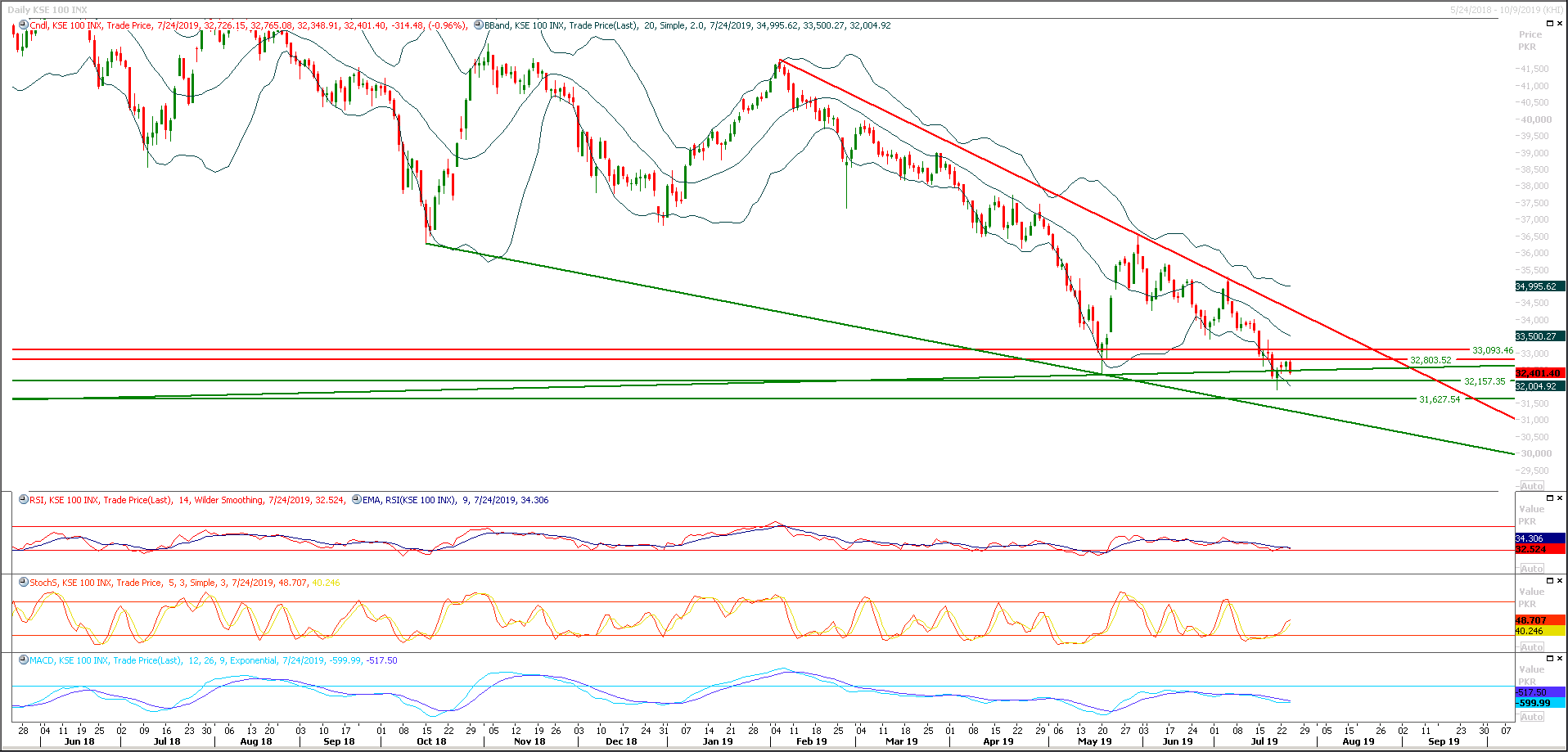Previous Session Recap
Trading volume at PSX floor dropped by 12.74 million shares or 13.11% on DoD basis, whereas the benchmark KSE100 index opened at 32,726.15, posted a day high of 32,765.08 and a day low of 32,348.91 points during last trading session while session suspended at 32,401.40 points with net change of -314.48 points and net trading volume of 72.69 million shares. Daily trading volume of KSE100 listed companies dropped by 6.93 million shares or 8.7% on DoD basis.
Foreign Investors remained in net long positions of 7.73 million shares and net value of Foreign inflow increased by 4.4 million US Dollars. Categorically, Foreign Corporate and Overseas Pakistanis remained in net long positions of 6.75 and 0.94 million shares respectively. While on the other side Local Individuals, Brokers and Insurance companies remained in net long positions of 9.45, 2.43 and 0.38 million shares but Local Companies, Banks and Mutual Funds remained in net selling positions of 9.12, 0.56 and 10.09 million shares respectively.
Analytical Review
Asian shares edge up before ECB decision, euro near two-month lows
Asian shares rose but struck a more cautious note than a tech-fueled rally on Wall Street, while the euro stayed near two-month lows as soft economic data fueled hopes the European Central Bank could cut rates at its meeting on Thursday. Japan’s Nikkei touched nearly three-month highs before trimming gains to be up 0.33%. Australian shares neared a 12-year peak, driven by expectations the ECB and the Federal Reserve will soon lower borrowing costs. “Lower rates are generally, in a traditional, mechanical way, good news for equity prices,” said Jim McCafferty, head of equity research, Asia ex-Japan, at Nomura.
LSM contracts 3.78pc
The large-scale manufacturing (LSM) sector shrank 3.78 per cent during May from a year ago, the Pakistan Bureau of Statistics (PBS) reported on Wednesday. The contraction came amid dismal performance in the fertiliser, leather, pharmaceutical, and chemical sectors raising fears of large-scale layoffs in the industrial sector. On a year-on-year basis, the LSM dipped by 3.5pc during the first 11 months (July-May) of this fiscal year — falling far behind the 8.1pc target set for the government for FY2018-19. Sector-wise, production data of 11 items from Oil Companies Advisory Committee registered a negative growth of 1.05pc whereas 36 items received from the Ministry of Industries and Production and 65 items by Provincial Bureaus of Statistics declined by 2.04pc and 0.7pc respectively.
Auto workers may lose jobs as sales plummet
The automotive industry fears that amid declining auto sales, the sector is likely to lose at least 10-15 per cent of the direct jobs over the next few months. Warning of tough times ahead, they said rising auto prices on the back of steep currency depreciation, imposition of federal excise duty in the range of 2.5-7.5pc depending on the engine size and tough economic climate have affected overall sales. Auto sales have declined by 7pc in the last financial year with experts fearing the market to shrink further by 15-20pc during the ongoing fiscal year.
Chinese firm to invest $20m in cab, cargo services
A Chinese firm is working on comprehensive business plan to provide five important services in Pakistan, initially investing $20 million, with future prospects of $600m. Chinese company Timesaco intends to provide a rapid services platform to citizens by launching five special services including a taxi service, heavy cargo delivery , orders delivery, moving automated teller machines (ATM) and vehicle advertisement facilities, Chief Operating Officer Timesaco, Donald Li said on Wednesday.
Govt borrowed $10.8b from multilateral, bilateral sources during FY2018-19
Pakistan had borrowed $10.8 billion from multilateral and bilateral sources during previous year to repay previous loans and financing current account deficit. According to the latest data of Economic Affairs Division (EAD), the country had received over $10.8 billion as foreign assistance in the year 2018-19. The PML-N government had budgeted foreign assistance of $9.69 billion for 2018-19. However, the PTI government had exceeded the budgeted level by more than one billion dollars mainly due to the massive repayment against previous loans. The aforesaid figure of $10.8 billion had not included $5.5 billion that Pakistan borrowed from Saudi Arabia, United Arab Emirates (UAE) and Qatar. Saudi Arabia had given $3 billion, UAE $2 billion and Qatar $500 million. Qatar would give further $2.5 billion to Pakistan, as it had committed to place $3 billion in SBP’s account on the request of government of Pakistan. The $5.5 billion received from friendly countries has been booked on balance sheet of the State Bank of Pakistan (SBP).
Asian shares rose but struck a more cautious note than a tech-fueled rally on Wall Street, while the euro stayed near two-month lows as soft economic data fueled hopes the European Central Bank could cut rates at its meeting on Thursday. Japan’s Nikkei touched nearly three-month highs before trimming gains to be up 0.33%. Australian shares neared a 12-year peak, driven by expectations the ECB and the Federal Reserve will soon lower borrowing costs. “Lower rates are generally, in a traditional, mechanical way, good news for equity prices,” said Jim McCafferty, head of equity research, Asia ex-Japan, at Nomura.
The large-scale manufacturing (LSM) sector shrank 3.78 per cent during May from a year ago, the Pakistan Bureau of Statistics (PBS) reported on Wednesday. The contraction came amid dismal performance in the fertiliser, leather, pharmaceutical, and chemical sectors raising fears of large-scale layoffs in the industrial sector. On a year-on-year basis, the LSM dipped by 3.5pc during the first 11 months (July-May) of this fiscal year — falling far behind the 8.1pc target set for the government for FY2018-19. Sector-wise, production data of 11 items from Oil Companies Advisory Committee registered a negative growth of 1.05pc whereas 36 items received from the Ministry of Industries and Production and 65 items by Provincial Bureaus of Statistics declined by 2.04pc and 0.7pc respectively.
The automotive industry fears that amid declining auto sales, the sector is likely to lose at least 10-15 per cent of the direct jobs over the next few months. Warning of tough times ahead, they said rising auto prices on the back of steep currency depreciation, imposition of federal excise duty in the range of 2.5-7.5pc depending on the engine size and tough economic climate have affected overall sales. Auto sales have declined by 7pc in the last financial year with experts fearing the market to shrink further by 15-20pc during the ongoing fiscal year.
A Chinese firm is working on comprehensive business plan to provide five important services in Pakistan, initially investing $20 million, with future prospects of $600m. Chinese company Timesaco intends to provide a rapid services platform to citizens by launching five special services including a taxi service, heavy cargo delivery , orders delivery, moving automated teller machines (ATM) and vehicle advertisement facilities, Chief Operating Officer Timesaco, Donald Li said on Wednesday.
Pakistan had borrowed $10.8 billion from multilateral and bilateral sources during previous year to repay previous loans and financing current account deficit. According to the latest data of Economic Affairs Division (EAD), the country had received over $10.8 billion as foreign assistance in the year 2018-19. The PML-N government had budgeted foreign assistance of $9.69 billion for 2018-19. However, the PTI government had exceeded the budgeted level by more than one billion dollars mainly due to the massive repayment against previous loans. The aforesaid figure of $10.8 billion had not included $5.5 billion that Pakistan borrowed from Saudi Arabia, United Arab Emirates (UAE) and Qatar. Saudi Arabia had given $3 billion, UAE $2 billion and Qatar $500 million. Qatar would give further $2.5 billion to Pakistan, as it had committed to place $3 billion in SBP’s account on the request of government of Pakistan. The $5.5 billion received from friendly countries has been booked on balance sheet of the State Bank of Pakistan (SBP).
Market is expected to remain volatile during current trading session.
Technical Analysis
The Benchmark KSE100 index is not being able to sustain above its major resistant region of 32,750 points on daily chart and both daily and hourly momentum indicators are losing strength. As of now index once again have penetrated below its major supportive trend line and it's expected that if index would succeed in sliding below 32,000 points then a new low below 31,700 points could be witnessed. It's recommended to stay cautious and trade with strict stop loss either index would succeed in closing above 32,700 or below 31,700 points.
 To Open picture in original resolution right click image and then click open image in a new tab
To Open picture in original resolution right click image and then click open image in a new tab


0 Comments
No comments yet. Be the first to comment!
Please log in to leave a comment.